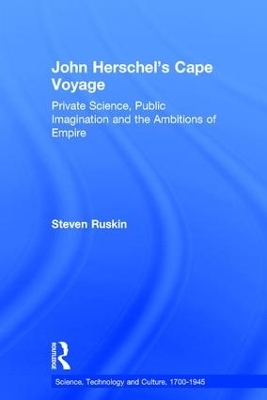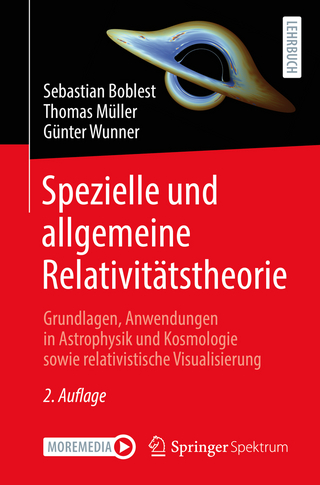
John Herschel's Cape Voyage
Private Science, Public Imagination and the Ambitions of Empire
Seiten
2004
Routledge (Verlag)
978-0-7546-3558-1 (ISBN)
Routledge (Verlag)
978-0-7546-3558-1 (ISBN)
Demonstrates the reason for Herschel's renown was due to the notion that his voyage was aligned with imperial ambition. It is the purpose of this book to make a case for the scientific, cultural and political singificance of his voyage and observations, as a means of demonstrating the relationship of science to imperial culture.
In 1833 John Herschel sailed from London to Cape Town, southern Africa, to undertake (at his own expense) an astronomical exploration of the southern heavens, as well as a terrestrial exploration of the area around Cape Town. After his return to England in 1838, and as a result of his voyage, he was highly esteemed and became Britain's most recognized man of science. In 1847 his southern hemisphere astronomical observations were published as the Cape Results. The main argument of Ruskin's book is that Herschel's voyage and the publication of the Cape Results, in addition to their contemporary scientific importance, were also significant for nineteenth-century culture and politics. In this book it is demonstrated that the reason for Herschel's widespread cultural renown was the popular notion that his voyage to the Cape was a project aligned with the imperial ambitions of the British government. By leaving England for one of its colonies, and pursuing there a significant scientific project, Herschel was seen in the same light as other British men of science (like James Cook and Richard Lander) who had also undertaken voyages of exploration and discovery at the behest of their nation. It is then demonstrated that the production of the Cape Results, in part because of Herschel's status as Britain's scientific figurehead, was a significant political event. Herschel's decision to journey to the Cape for the purpose of surveying the southern heavens was of great significance to almost all of Britain and much of the continent. It is the purpose of this book to make a case for the scientific, cultural, and political significance of Herschel's Cape voyage and astronomical observations, as a means of demonstrating the relationship of scientific practice to broader aspects of imperial culture and politics in the nineteenth century.
In 1833 John Herschel sailed from London to Cape Town, southern Africa, to undertake (at his own expense) an astronomical exploration of the southern heavens, as well as a terrestrial exploration of the area around Cape Town. After his return to England in 1838, and as a result of his voyage, he was highly esteemed and became Britain's most recognized man of science. In 1847 his southern hemisphere astronomical observations were published as the Cape Results. The main argument of Ruskin's book is that Herschel's voyage and the publication of the Cape Results, in addition to their contemporary scientific importance, were also significant for nineteenth-century culture and politics. In this book it is demonstrated that the reason for Herschel's widespread cultural renown was the popular notion that his voyage to the Cape was a project aligned with the imperial ambitions of the British government. By leaving England for one of its colonies, and pursuing there a significant scientific project, Herschel was seen in the same light as other British men of science (like James Cook and Richard Lander) who had also undertaken voyages of exploration and discovery at the behest of their nation. It is then demonstrated that the production of the Cape Results, in part because of Herschel's status as Britain's scientific figurehead, was a significant political event. Herschel's decision to journey to the Cape for the purpose of surveying the southern heavens was of great significance to almost all of Britain and much of the continent. It is the purpose of this book to make a case for the scientific, cultural, and political significance of Herschel's Cape voyage and astronomical observations, as a means of demonstrating the relationship of scientific practice to broader aspects of imperial culture and politics in the nineteenth century.
Steven Ruskin is a professor at the Colorado Technical University, in the USA.
Contents: Introduction; Part I Herschel's Cape Voyage: Recasting Herschel's Cape voyage: filial duty vs. Humboldtian traveling; The politics of Herschel's Cape voyage; Appropriating astronomy: Herschel's Cape observations, real and imagined. Part II the Production of the Cape Results: The Cape Results: preparation and publication; The Cape Results: distribution and reception. Part 3 Conclusion: Herschel, icon; Appendices; Bibliography; Index.
| Erscheint lt. Verlag | 26.3.2004 |
|---|---|
| Reihe/Serie | Science, Technology and Culture, 1700-1945 |
| Verlagsort | London |
| Sprache | englisch |
| Maße | 156 x 234 mm |
| Gewicht | 453 g |
| Themenwelt | Naturwissenschaften ► Physik / Astronomie ► Astronomie / Astrophysik |
| ISBN-10 | 0-7546-3558-9 / 0754635589 |
| ISBN-13 | 978-0-7546-3558-1 / 9780754635581 |
| Zustand | Neuware |
| Haben Sie eine Frage zum Produkt? |
Mehr entdecken
aus dem Bereich
aus dem Bereich
Grundlagen, Anwendungen in Astrophysik und Kosmologie sowie …
Buch | Softcover (2022)
Springer Spektrum (Verlag)
49,99 €
die Geschichte und Erforschung unserer Galaxie
Buch | Hardcover (2023)
C.Bertelsmann (Verlag)
30,00 €
Von Hubble-, James-Webb- und anderen Großteleskopen bis zu …
Buch | Softcover (2024)
Springer (Verlag)
22,99 €


